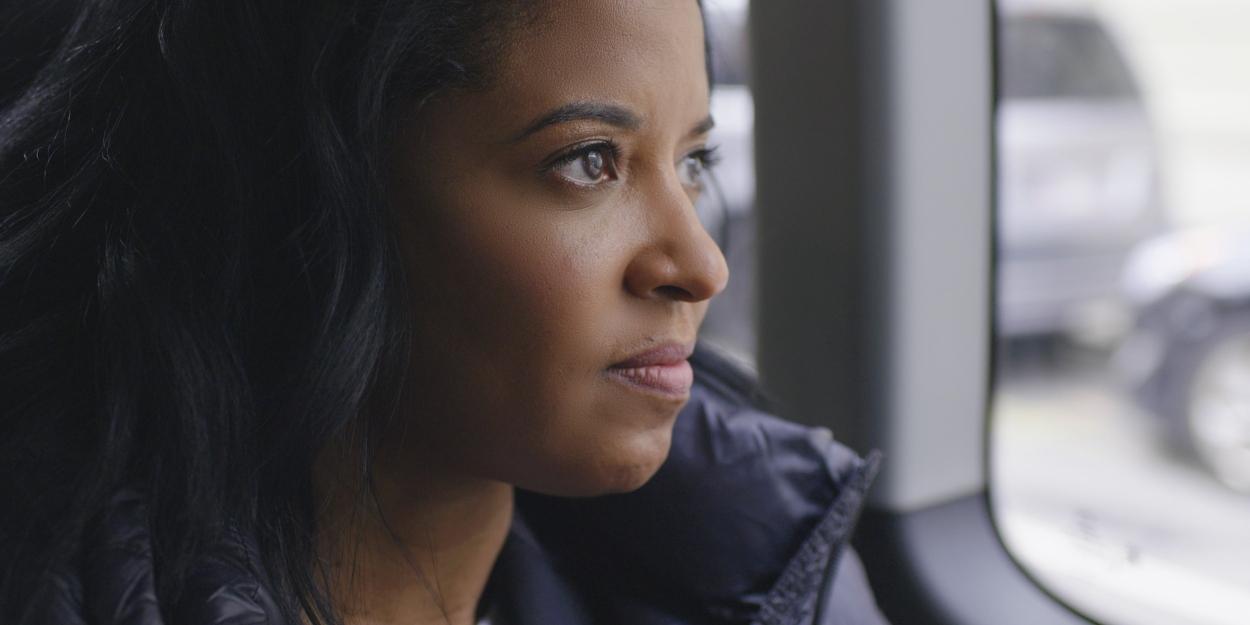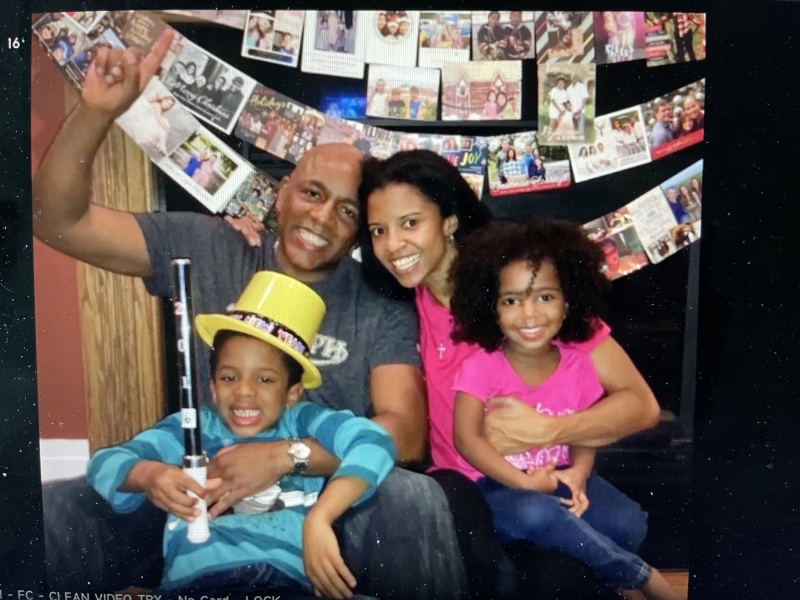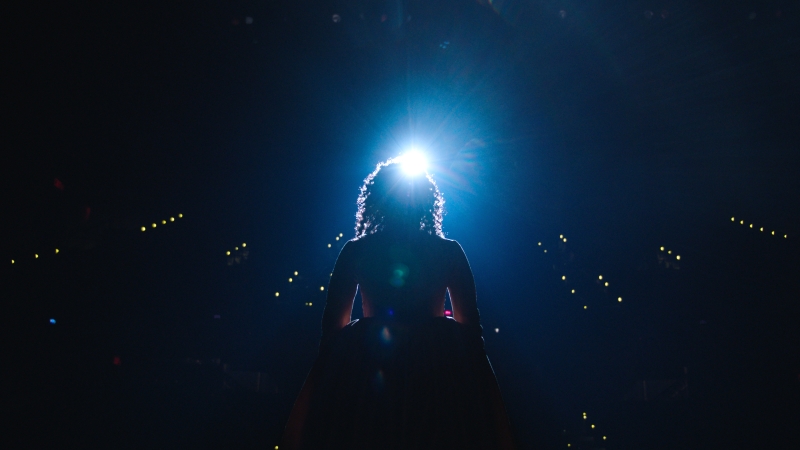Director Chris Bolan and Kelli O’Hara talk about Renée Elise Goldsberry’s documentary SATISFIED

In 2016, Renée Elise Goldsberry won a Tony Award for her portrayal of Angelica Schuyler in Lin-Manuel Miranda’s Hamilton. During her time in this groundbreaking production, Goldsberry filmed candid vlogs depicting the difficult balance between the high expectations of Hamilton and dealing with motherhood.
8 years later, a new documentary premiered at the Tribeca Festival that explores her experience on that show and her other joy in life: her family. Satisfied, directed by Chris Bolan and Melissa Haizlip, uses the vlogs to tell her story, which also includes new footage and interviews from Goldsberry, Miranda and her family.
BroadwayWorld caught up with Bolan and producer, Tony Award-winning actress and mother Kelli O’Hara to talk about this heartfelt film and the importance of Renée’s story.
For clarity and length, this interview has been shortened.
How did the development of this documentary begin?
Chris: IIt started during the Covid lockdown of 2020 when my son’s mother was giving tap dancing lessons on our front lawn. She was a Broadway performer herself and Kelli (O’Hara) brought her daughter over for a lesson. Renée had just moved to the area and brought her daughter as well. Hamilton was about to come out on Disney+ and Renée told Kelli that she had all this behind-the-scenes footage and that she wished she had done more with it. She was about to upload it all to Instagram and Kelli was just like, “Whoa, wait a minute.”
Before we met Renée, Kelli and I had talked about developing a project that focused on Broadway mothers. I’ve been on Broadway and I know that experience as a father, and of course Kelli has had experience with that too. Those stories weren’t being told. When Renée mentioned that, Kelli said, “You should do more with that.” Renée expressed a wish that she had made a documentary or knew a documentary filmmaker, and Kelli said, “Well, you happened to be sitting in the house of someone who makes documentaries.”
Kelli told me what they had talked about and I thought it sounded really interesting. I was willing to help out in any way I could, but I didn’t know what we had and neither did Reneé. We did a series of Zoom interviews – probably eight hours of just talking. At the end, Renée finally asked me point blank, “Do you want to direct or not?” I said I would love to. Kelli, Renée and I then started looking for a production company, a co-director named Melissa Haizlip, all that.
So there were three of them from the beginning.
Chris: That was it. I wanted to make sure all different voices were part of this film. I have the voice of a theater actor and a father, and my son’s mother was on Broadway. But I’m also a white cisgender man and I wanted the female perspective. I wanted the perspective of a black woman. I wanted as many voices as possible to make sure we told Renée’s story as honestly and truthfully as possible.
Kelli, I’d love to hear what it was like working with the other producers on the film.
Kelly: My main entry point was always Chris. When we first talked about it,We started meeting with different producers to choose from and of course it was ultimately up to Chris and Renée who she wanted to work with in making this film. I remember when Stick Figure was in talks and it was some of her previous work that really moved Renée. When Chris started working on the film he would send me clips of it or different clips of interviews for me to watch. My involvement was more my interaction with Chris and then he would bring my thoughts back to the production companies. Chris was a real mediator and had to keep a lot of opinions and emotions under control. I take my hat off to Chris Bolin.
I was struck by how personal this story is and how much trust had to exist between everyone on the team. How do you build trust when so many people are involved?
Chris: Renée really trusted Kelli. She and I have known each other for years and we have that trust. Because both Kelli and Renée are mothers, I think Renée felt very safe in the core team that was formed here. Because there are a lot of cooks in the kitchen and things can get tricky. Throughout the whole process, Kelli was a touchstone for me and for Renée. When things got a little scary, Renée would of course come to me, but Kelli had a perspective that I just didn’t have as a mother, as a Broadway star. I think we both managed to make Renée feel good.
Kelly: I think you need a whole team on these things. I know – and this is a good feeling – the reality of the first conversation with Renée, who wanted to do it and put the pieces together to make the work. When Renée had feelings or ideas about what she thought belonged in the film, she would call me. And then I would call Chris. I was glad to be in that position because you need someone on the team who is like-minded and can understand these particular things. I was proud to be a part of it so I could say, “Hey, I know for a fact as a mother that this would never happen” or “This would definitely happen.” I wanted there to be someone on the team who had lived the experience as closely as possible.
What I appreciated about the film was that Renée took the lead and told the story through her narration and the interviews. There were a few other commentators, but they were used sparingly. I’m curious about that decision.
Chris: That was very deliberate. Coming from an acting background, I like to observe. The trap with this film is that we could have had any glitzy, fancy celebrity spokesperson in the world. I told Renée at the beginning, if this was going to be a vanity project or a biopic, that would be great, but I’m not the right person for it. I really wanted honesty and authenticity. I wanted to see her without makeup and with the stresses of being a mother. To her credit, she wanted to tell that story and that was what Kelli was interested in as well. People want to put as many fancy celebrities in as possible and I really resisted that. I wanted the film to be character driven and it’s not often that you get to focus on one character, which I think is a gift in a film.
To the Mirandas’ credit, Lin was very aware of this. He felt that Renée’s story deserved to be Renée’s story and not be overshadowed by Hamilton. HWe wanted to make sure we didn’t cram it with Lin-Manuel Miranda, which I thought was great. I agreed with him completely and it showed how much they cared for and trusted Renée and how protective they were towards her.

The film deals a lot with work-life balance. We see Renée’s support system in her husband and family. Kelli, you’ve had a great career as an actress and you’re also a mother. What kind of support have you felt most in your own career?
Kelly: It was very important to me to get Alexis (Johnson) to talk about her husband’s story. The truth is that we are going through a time right now where the question is being raised about whether a woman should work and have a passion and be a good mother at the same time. In the past, one of the reasons that went in the opposite direction was because one parent helped at home. I thought it was a great part of our story to mention the fact that Renée has a partner in Alexis. I have a partner in Greg Naughton, the has his own passions, but is also happy when I go out and follow my passion. He knows that it makes me a fulfilled person who comes home to love his children and family.
We share the tasks as much as possible. He does some, I do others. I don’t think I would ever be able to do both at the same time in my life without this partnership. I really love having a husband who doesn’t feel threatened by my career, but celebrates it and is happy about it and then reminds me of priorities every now and then.
You also need a team around you that respects your boundaries and priorities. I’ve built that around me. I have this manager who knows how important my kids are, but she also knows what kind of work I want to do. There are sacrifices that have to be made both ways, and I always want the sacrifices to be less on my family’s side. Some of this storyline with Renée really shows that. But then something like Hamilton comes along and you ask your family and your agents, “How do we balance the two?”
I wonder if there’s a world in the future where Renée Elise Goldsberry gets pregnant and doesn’t give up on Hamilton. She does a show with growing dresses, has the baby and then she comes back and finishes the show. I wonder if there’s a world where we can suspend our imaginations. I did that with Far from Heaven, which I know was a crazy thing. I did the show until I was eight months pregnant. It’s a shame when I look at all my friends who have given up their careers because that’s the way the business works. I want to believe that anything is possible as long as the right people believe in it.
What impressed me about Renée and her story is her resilience. If you had to sum up in one word what makes her so incredible, what would it be?
Chris: A fighter. She doesn’t give up. She fights for her career, fights for her kids and her family, fights for her friends and fights for what she believes in. There are a million words I could use to describe her too. She is so grounded considering her career. A lot of times you can do these celebrity projects and it’s an absolute nightmare. The fact that we can part as friends after being in the trenches together for four years really says something about her and the type of person she is. She is a lovely, lovely human being and I am so grateful and honored that she trusted us to tell her story.
Satisfied recently had its world premiere at the Tribeca Festival. The film is currently looking for a distributor.



:max_bytes(150000):strip_icc():focal(729x287:731x289)/rob-riggle-travis-kelce-071124-ba13678b968a47c3a3ceedbea5d8a76c.jpg)
